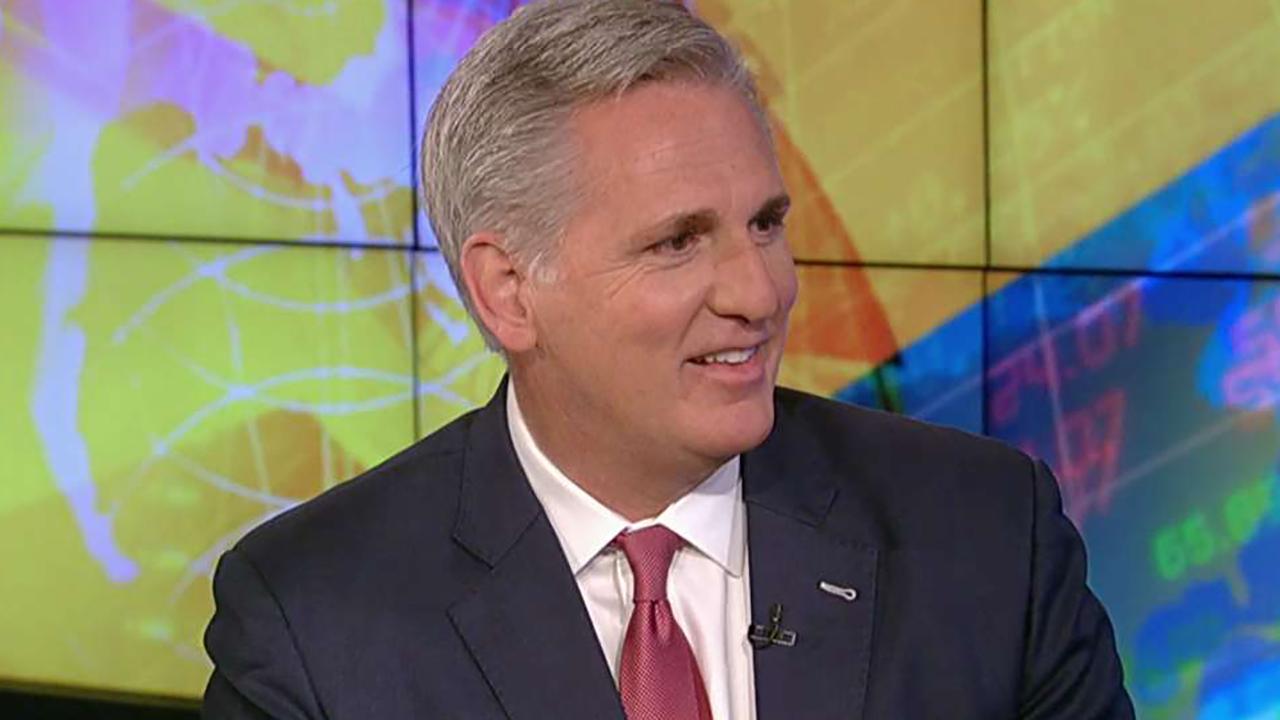Tax reform timeline: Rep. McCarthy says GOP making "great progress"
House Majority Leader Kevin McCarthy on Sunday said Republican congressional lawmakers have made “great progress” as they attempt to unify a tax reform bill before the Christmas holiday.
“The House and Senate have two different bills—structurally they’re pretty similar. They’re going to work out those differences. Hopefully they can get that done this week; we come back the next week and vote on it,” McCarthy, R-Calif., told Maria Bartiromo on “Sunday Morning Futures.”
While the GOP moves ahead to get the legislation to President Donald Trump’s desk as soon as possible, concerns have mounted about how much it could impact the national deficit and debt. The Committee for a Responsible Federal Budget has said the Senate’s version would cost about $1.4 trillion over a decade, and with interest, would be $2.2 trillion of debt over the next decade. The biggest question now is how to pay for the tax cuts proposed by federal lawmakers, which includes lowering the corporate tax rate to 20% from 35%. However, McCarthy said it can be done with the help of economic growth.
“If we grow 0.4%, you will pay for all this. The debt that we have is one of the most critical things we have to look after. But we cannot solve this debt problem without growing the economy,” he said.
Another worry among Americans -- including those living in high-tax states such as New York, New Jersey and McCarthy’s home state of California -- is the state and local income tax (SALT) deduction. Originally, the Senate bill included a full repeal of SALT, though it now matches the House bill, which keeps the deduction for property taxes up to $10,000. McCarthy said he’d favor changes to the legislation that would allow taxpayers to use the money toward other state and local income taxes.
“I would like to add income, saying $10,000 for one or the other,” he said. “Because there’s some elements in California because of Prop 13, you might not reach it on property tax, but your income could.”
Despite the similarities between the two tax bills, the Senate’s legislation includes the alternative minimum tax (AMT), which was created in an attempt to prevent the wealthiest Americans from using loopholes to avoid paying taxes, while the House’s does not. Originally, the AMT affected fewer than one million taxpayers each year through the late 1990s, according to the Tax Policy Center (TPC). Since the AMT was not automatically updated for inflation, income levels remained at the original 1969 level, meaning more middle-class Americans (roughly five million, according to TPC) were impacted by the tax. In an effort to fix this, Congress started implementing a “patch” annually, until a permanent one was instituted in January 2013. The current exemption amount for single taxpayers is $54,300 and $84,500 for married filing jointly. Under the new bill, the exemption would be increased to $70,300 for singles and $109,400 for married couples. However, the AMT is one part of the Senate bill that McCarthy wants removed.
“If somebody was paying the alternative minimum tax and SALT, that actually is a larger hit on your taxes than before, so that saves you more money in the process,” McCarthy said, adding that it would “hurt” businesses as well.
The California Republican also said he wants to lower the top income tax rate because he doesn’t believe high-earners should be “punished for being successful."
The massive impact the sweeping tax reform legislation will have on Americans across the country could also play a pivotal role in determining the outcome of the midterm elections next year. According to a recent Quinnipiac University poll, most voters disapprove of Republican congressional plan. McCarthy, however, said he isn’t stressing about the 2018 elections.
“If you worry about the election, you’re not going to accomplish anything,” he said. “Why don’t you go accomplish things that you promised to do, then go back to the voters and show what you’re able to achieve, I think you’ll get a good result.”




















